周四课教案 Melody
幼儿园大班教案《星期歌》英语教案
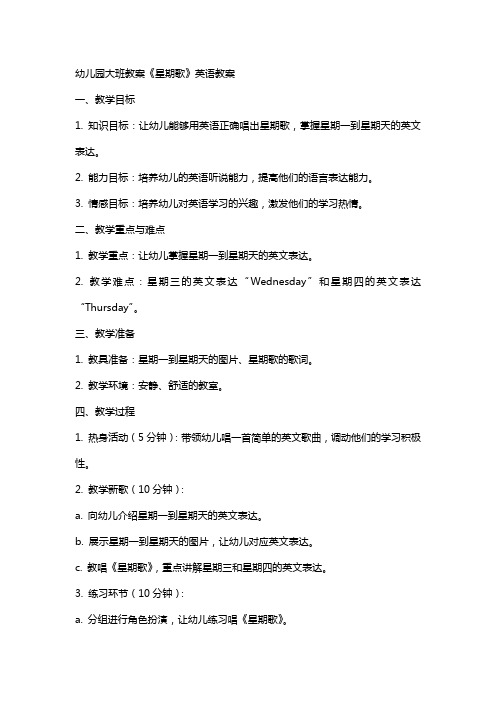
幼儿园大班教案《星期歌》英语教案一、教学目标1. 知识目标:让幼儿能够用英语正确唱出星期歌,掌握星期一到星期天的英文表达。
2. 能力目标:培养幼儿的英语听说能力,提高他们的语言表达能力。
3. 情感目标:培养幼儿对英语学习的兴趣,激发他们的学习热情。
二、教学重点与难点1. 教学重点:让幼儿掌握星期一到星期天的英文表达。
2. 教学难点:星期三的英文表达“Wednesday”和星期四的英文表达“Thursday”。
三、教学准备1. 教具准备:星期一到星期天的图片、星期歌的歌词。
2. 教学环境:安静、舒适的教室。
四、教学过程1. 热身活动(5分钟):带领幼儿唱一首简单的英文歌曲,调动他们的学习积极性。
2. 教学新歌(10分钟):a. 向幼儿介绍星期一到星期天的英文表达。
b. 展示星期一到星期天的图片,让幼儿对应英文表达。
c. 教唱《星期歌》,重点讲解星期三和星期四的英文表达。
3. 练习环节(10分钟):a. 分组进行角色扮演,让幼儿练习唱《星期歌》。
b. 邀请幼儿上台展示,给予鼓励和表扬。
4. 总结与拓展(5分钟):让幼儿复述所学的星期英文表达,引导他们用英语进行日常交流。
五、课后作业1. 家长协助幼儿在家练习唱《星期歌》,加强英语听说能力。
2. 鼓励幼儿用英语和父母交流,分享所学知识。
教学反思:本节课通过图片、歌曲等形式,让幼儿掌握了星期一到星期天的英文表达。
在教学过程中,注意调动幼儿的积极性,让他们在轻松愉快的氛围中学习。
课后作业的设置,旨在让幼儿将所学知识运用到实际生活中,提高他们的英语实践能力。
在今后的教学中,继续探索更多有趣的教学方法,激发幼儿对英语学习的兴趣。
六、教学评价1. 课堂表现评价:观察幼儿在课堂上的参与程度、学习态度以及与同学的互动情况。
2. 歌曲演唱评价:评估幼儿对《星期歌》的掌握程度,包括发音准确性、节奏感和合唱效果。
3. 作业完成评价:检查幼儿课后作业的完成质量,包括唱《星期歌》的熟练程度和与家长的互动情况。
中班美乐蒂英语律动教案:跟着音乐学习英语语音

中班美乐蒂英语律动教案:跟着音乐学习英语语音引言教育是人类社会的基石,语言教育更是不可或缺的部分。
学习英语,除了掌握词汇和语法外,更需要注重语音的学习。
中班美乐蒂英语律动教案就是一种利用音乐的方式来帮助孩子学习英语语音的教学方法。
下面将就中班美乐蒂英语律动教案的理论、实践和优点进行详细的阐述。
理论基础音乐教育有利于儿童语言发展,主要通过两条途径:一是音乐活动与语言活动有相似的神经心理基础和过程,有些音乐活动本身既是语言活动,通过这些相似,能在很大程度上促进中枢神经系统的发展,培养和提高儿童的语言能力。
二是音乐的节奏、韵律、音调和语言的节奏、韵律、音调等,在审美意义上具有同等的效果,能使儿童在音乐活动中接受和理解这些效果,又能将所接受的和理解的东西应用于日常生活中。
基于以上理论,中班美乐蒂英语律动教案突破传统的语音教学方式,通过结合音乐和语音的方式,使儿童在音乐活动中学习英语语音。
教案实践使用中班美乐蒂英语律动教案,教学步骤大致如下:第一步:了解旋律,引入口语。
采用歌曲来引入口语学习,让孩子们认识不同的旋律和节奏,培养他们的听力感知和语感。
第二步:学习音标和音位的发音方法。
介绍音标和音位的发音方法,通过模仿教师的发音,让孩子们跟读发音,强化音标和音位的记忆和认知。
第三步:用歌曲教学口语,让儿童在流畅的旋律中学习英语口语。
使用歌曲来教学口语,结合歌曲节奏,让孩子们跟读歌词,不知不觉中培养出孩子们的英语语感和语调。
第四步:练习发音和语音组合。
通过练习发音和语音组合,帮助孩子们更准确地掌握英语语音,同时增加他们的自信和兴趣。
第五步:交流互动,在游戏和活动中提高语音水平。
展开各种游戏和活动,让孩子们在语言交流中提高自己的语音水平,增加实际运用英语口语的机会。
优点分析中班美乐蒂英语律动教案的主要优点如下:一、增加孩子学习英语的兴趣和积极性音乐教育可以激发孩子的生活和学习的兴趣,而且教育的表现形式非常鲜明和生动,可以吸引孩子的注意力,并且与英语口语学习直接沟通,课程活泼有趣,孩子们很容易产生学习兴趣和积极性。
大班音乐教育活动do le mi教案【含教学反思】 (2)

大班音乐教育活动do le mi教案【含教学反思】
一、教学背景
我们班级的孩子年龄介于4-5岁之间,这个年纪的孩子已开始具
备了一定的音乐感知能力,但是他们对于音乐理论还不太理解。
为了
激发他们的音乐兴趣,让他们在游戏中学习音乐知识,我设计了这个
do le mi 教育活动。
二、活动目标
通过这个活动,我希望能够达到以下目的:
1.让孩子们对音乐产生兴趣,培养他们的音乐感知能力。
2.让孩子们学会音乐的基础知识,如听力、节奏、嗓音。
3.培养孩子们的合作意识和交际能力。
三、活动内容
1. 导入活动
在活动开始前,我播放了一些小孩喜欢的歌曲,如《儿童舞曲》、《小星星》等,让孩子们放松心情,进入音乐世界。
2. 音乐游戏
这个环节是本次活动的重点。
我为孩子们准备了一些相应的音乐
游戏,具体如下:。
大班上学期音乐教案《do le mi》
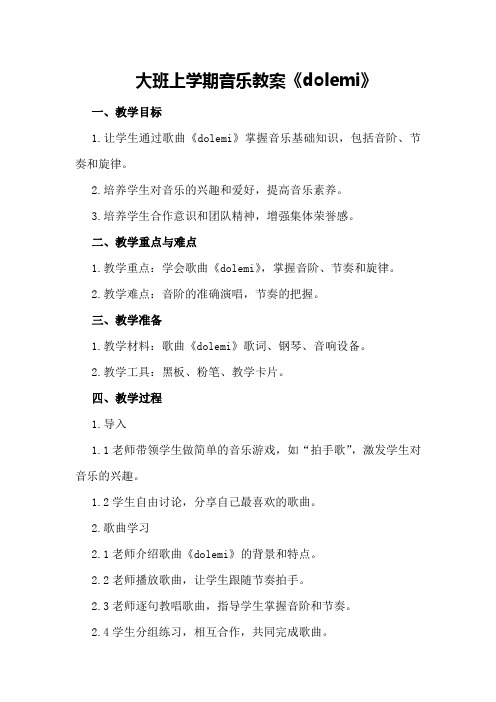
大班上学期音乐教案《dolemi》一、教学目标1.让学生通过歌曲《dolemi》掌握音乐基础知识,包括音阶、节奏和旋律。
2.培养学生对音乐的兴趣和爱好,提高音乐素养。
3.培养学生合作意识和团队精神,增强集体荣誉感。
二、教学重点与难点1.教学重点:学会歌曲《dolemi》,掌握音阶、节奏和旋律。
2.教学难点:音阶的准确演唱,节奏的把握。
三、教学准备1.教学材料:歌曲《dolemi》歌词、钢琴、音响设备。
2.教学工具:黑板、粉笔、教学卡片。
四、教学过程1.导入1.1老师带领学生做简单的音乐游戏,如“拍手歌”,激发学生对音乐的兴趣。
1.2学生自由讨论,分享自己最喜欢的歌曲。
2.歌曲学习2.1老师介绍歌曲《dolemi》的背景和特点。
2.2老师播放歌曲,让学生跟随节奏拍手。
2.3老师逐句教唱歌曲,指导学生掌握音阶和节奏。
2.4学生分组练习,相互合作,共同完成歌曲。
3.音乐知识讲解3.1老师讲解音阶、节奏和旋律的基本概念。
3.2学生跟随老师,用手指演示音阶,感受音高的变化。
3.3学生跟随老师,用拍子练习节奏。
4.活动环节4.1学生分成两个小组,进行歌曲接龙比赛。
4.2学生自由组合,进行歌曲表演。
5.1学生分享自己在学习过程中的收获和感受。
五、教学反思1.教学过程中,老师要注意观察学生的反应,及时调整教学方法和节奏。
2.针对不同学生的学习程度,老师要给予个别辅导,确保每个学生都能掌握歌曲。
3.在活动环节,老师要鼓励学生积极参与,培养学生的合作意识和团队精神。
一、导入1.1老师带领学生做“拍手歌”游戏,让学生跟随节奏拍手。
1.2学生自由讨论,分享自己最喜欢的歌曲。
二、歌曲学习2.1老师介绍歌曲《dolemi》的背景和特点。
2.2老师播放歌曲,让学生跟随节奏拍手。
2.3老师逐句教唱歌曲,指导学生掌握音阶和节奏。
2.4学生分组练习,相互合作,共同完成歌曲。
三、音乐知识讲解3.1老师讲解音阶、节奏和旋律的基本概念。
大班音乐教育活动do le mi教案【含教学反思】
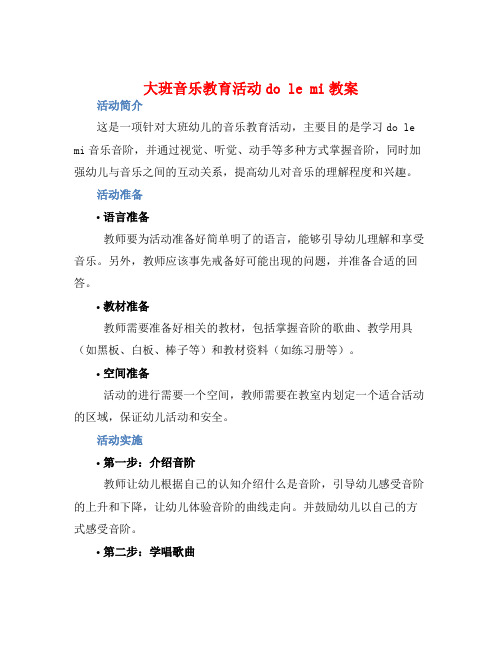
大班音乐教育活动do le mi教案活动简介这是一项针对大班幼儿的音乐教育活动,主要目的是学习do le mi音乐音阶,并通过视觉、听觉、动手等多种方式掌握音阶,同时加强幼儿与音乐之间的互动关系,提高幼儿对音乐的理解程度和兴趣。
活动准备•语言准备教师要为活动准备好简单明了的语言,能够引导幼儿理解和享受音乐。
另外,教师应该事先戒备好可能出现的问题,并准备合适的回答。
•教材准备教师需要准备好相关的教材,包括掌握音阶的歌曲、教学用具(如黑板、白板、棒子等)和教材资料(如练习册等)。
•空间准备活动的进行需要一个空间,教师需要在教室内划定一个适合活动的区域,保证幼儿活动和安全。
活动实施•第一步:介绍音阶教师让幼儿根据自己的认知介绍什么是音阶,引导幼儿感受音阶的上升和下降,让幼儿体验音阶的曲线走向。
并鼓励幼儿以自己的方式感受音阶。
•第二步:学唱歌曲教师可以让幼儿学唱一些简单的歌曲,其中包括do le mi音阶,帮助幼儿更好地理解音阶。
在教唱过程中,教师需要让幼儿边唱边听边做动作,帮助幼儿记住音阶。
•第三步:练习音阶在幼儿掌握do le mi音阶之后,教师可以让幼儿通过继续练习掌握更多的音阶,同时在练习过程中加入游戏元素,使幼儿在学习中保持更高的兴趣和积极性。
•第四步:音阶应用在幼儿掌握了do le mi音阶以及其他音阶之后,教师可以让幼儿识谱,例如通过教学敲打乐器或演唱歌曲等方式,让幼儿感受到音阶与谱子的联系。
如果幼儿已经掌握了相关技能,老师还可以导入歌词,让幼儿感受如何用音阶歌唱歌曲。
•第五步:总结回顾在活动结束前,教师应该帮助幼儿进行总结和回顾,让幼儿从自己掌握的知识和技能中找到正面的经验,并帮助他们更好地了解自己,补充自己的知识和技能。
教学反思此次音乐教育活动主要是针对大班幼儿的掌握音阶,通过视觉、听觉、动手等多种方式掌握音阶,使幼儿对音阶和音乐的理解更加深刻、兴趣更加浓厚。
教师在活动的准备和实施中出色地完成指导,激发幼儿在学习中的积极性和好感度,并帮助他们增强了自信心和自主性,使他们在掌握音阶的过程中获得了快乐和成就感。
幼儿园大班音乐教案《do le mi》
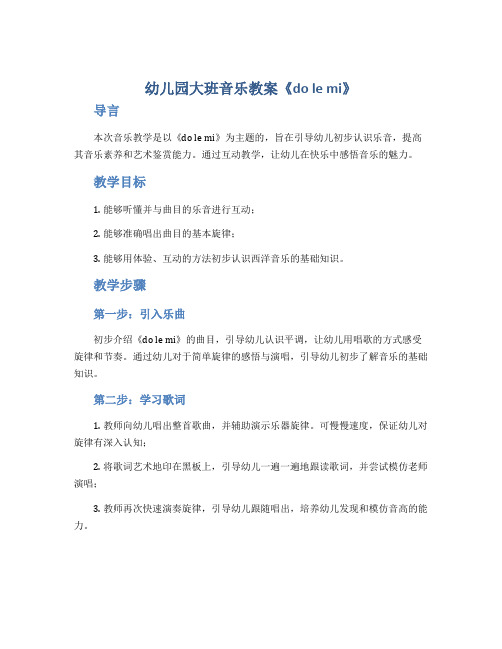
幼儿园大班音乐教案《do le mi》导言本次音乐教学是以《do le mi》为主题的,旨在引导幼儿初步认识乐音,提高其音乐素养和艺术鉴赏能力。
通过互动教学,让幼儿在快乐中感悟音乐的魅力。
教学目标1.能够听懂并与曲目的乐音进行互动;2.能够准确唱出曲目的基本旋律;3.能够用体验、互动的方法初步认识西洋音乐的基础知识。
教学步骤第一步:引入乐曲初步介绍《do le mi》的曲目,引导幼儿认识平调,让幼儿用唱歌的方式感受旋律和节奏。
通过幼儿对于简单旋律的感悟与演唱,引导幼儿初步了解音乐的基础知识。
第二步:学习歌词1.教师向幼儿唱出整首歌曲,并辅助演示乐器旋律。
可慢慢速度,保证幼儿对旋律有深入认知;2.将歌词艺术地印在黑板上,引导幼儿一遍一遍地跟读歌词,并尝试模仿老师演唱;3.教师再次快速演奏旋律,引导幼儿跟随唱出,培养幼儿发现和模仿音高的能力。
第三步:乐器演奏通过教学掌握平调之后,通过互动让幼儿在各自的乐器上演奏和弹奏。
教师列出基本音乐符号,教幼儿如何读谱,让幼儿加深对乐谱的认知。
第四步:集体合作演奏让幼儿一齐演奏曲目,通过互相配合,提升幼儿的阅读能力和合作意识。
教师提供音乐节奏拍子,为学生演奏提供指导和帮助。
第五步:课堂小结简单回顾一下这堂音乐课的内容,关注幼儿们的理解和疑问。
通过这样的课堂小结,让幼儿掌握本节课所学音乐内容和技能。
教学方法1.循序渐进:按照学生的认知水平、兴趣和特点,安排学习步骤,让幼儿自然地接受教育。
2.体验式教学:以互动、合作、探究为主要特点,通过创造性交流、自主探究等途径,激发幼儿的兴趣,使他们在学习中充分发挥自己的主动性和创造性;3.同步发展:注重幼儿在各种情况下的全面发展,充分发挥学生的自我认知、自我评价和自我调控能力。
教学资源1.著名音乐家简介或引子;2.一个乐器或音乐道具,如琴、鸟叫模拟器等;3.黑板、白板以及白专用笔和其它需要使用的调制器和跟带。
教学效果经过本节课的学习,幼儿对于音乐的基本知识和技能都得到了很好的掌握。
中班:美乐蒂英语(单词句子律动教案)(5篇)

中班:美乐蒂英语(单词句子律动教案)(5篇)第一篇:中班:美乐蒂英语 (单词句子律动教案)[中班:美乐蒂英语(单词句子律动教案)](单词句子律动教案)title=中班:美乐蒂英语(单词句子律动(单词句子律动教案)title=中班:美乐蒂英语(单词句子律动(单词句子律动教案)title=中班:美乐蒂英语(单词句子律动(单词句子律动教案)title=中班:美乐蒂英语(单词句子律动(单词句子律动教案)title=中班:美乐蒂英语(单词句子律动(单词句子律动教案)title=中班:美乐蒂英语(单词句子律动(单词句子律动教案)title=中班:美乐蒂英语(单词句子律动(单词句子律动教案)title=中班:美乐蒂英语(单词句子律动lesson1(一)一、活动目标:1、重温学习美乐蒂英语的快乐,中班:美乐蒂英语(单词句子律动教案)。
二、活动准备:教学卡片三、活动过程:(一)、热身活动复习26个字母及律动操(二)、导入活动1、教师和幼儿共同讨论一下,我们起床了,要做哪些事后才能背着书包来上学呢。
2、教师汇总幼儿所述,卖关子地出示牙齿卡片,和幼儿一起发音读teeth(记住双齿咬住舌头发th的音),和幼儿玩游戏,看看谁最厉害,最后发音咬住舌头发th的音了,并表扬他。
请幼儿伸出一食指对着自己的牙齿上下挥动,和教师一起说brush my teeth,教师和幼儿互动学说brush my teeth。
hair,好了现在我们要背起书包去哪呀?和幼儿一起摆动双手说go to school,用快慢的速度练习go to school。
(三)、游戏操练你说我做或我说你做来进行巩固加深所学内容(四)、结束教师和幼儿一起对所展示的卡片说一遍。
lesson1(二)一、活动目标:1、重温学习美乐蒂英语的快乐。
brush my teeth,round and roundbrush my teeth,left and rightbrush my teeth,day and night二、活动准备:教学卡片三、活动过程:(一)、热身活动school并进行游戏你说我做或我说你做来巩固加深。
Melody教案
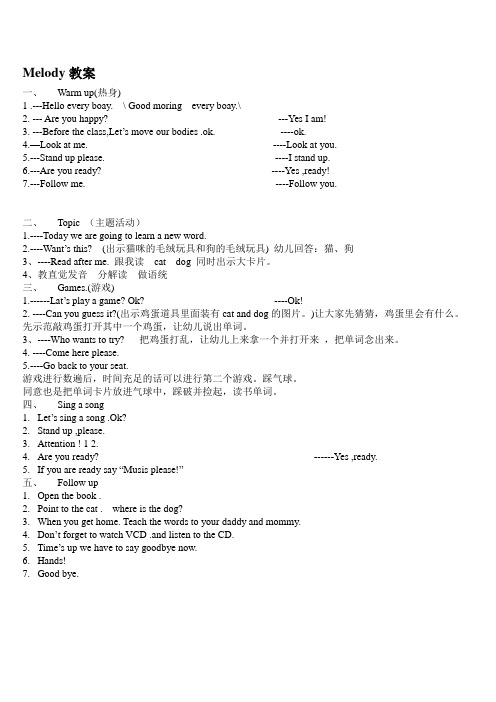
Melody教案一、Warm up(热身)1 .---Hello every boay. \ Good moring every boay.\2. --- Are you happy? ---Y es I am!3. ---Before the class,Let’s move our bodies .ok. ----ok.4.—Look at me. ----Look at you.5.---Stand up please. ----I stand up.6.---Are you ready? ----Y es ,ready!7.---Follow me. ----Follow you.二、Topic (主题活动)1.----Today we are going to learn a new word.2.----Want’s this? (出示猫咪的毛绒玩具和狗的毛绒玩具) 幼儿回答:猫、狗3、----Read after me. 跟我读cat dog 同时出示大卡片。
4、教直觉发音分解读做语统三、Games.(游戏)1.------Lat’s play a game? Ok? ----Ok!2. ----Can you guess it?(出示鸡蛋道具里面装有cat and dog的图片。
)让大家先猜猜,鸡蛋里会有什么。
先示范敲鸡蛋打开其中一个鸡蛋,让幼儿说出单词。
3、----Who wants to try? 把鸡蛋打乱,让幼儿上来拿一个并打开来,把单词念出来。
4. ----Come here please.5.----Go back to your seat.游戏进行数遍后,时间充足的话可以进行第二个游戏。
踩气球。
同意也是把单词卡片放进气球中,踩破并捡起,读书单词。
四、Sing a song1.Let’s sing a song .Ok?2.Stand up ,please.3.Attention ! 1 2.4.Are you ready? ------Y es ,ready.5.If you are ready say “Musis please!”五、Follow up1.Open the book .2.Point to the cat . where is the dog?3.When you get home. Teach the words to your daddy and mommy.4.Don’t forget to watch VCD .and listen to the CD.5.Time’s up we have to say goodbye now.6.Hands!7.Good bye.。
Hello Melody,天天都Happy!——美乐蒂四大流程附warm up chants~
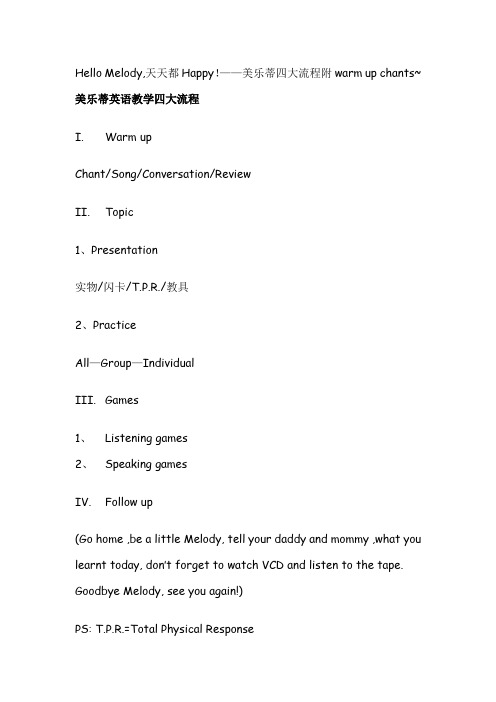
Hello Melody,天天都Happy!——美乐蒂四大流程附warm up chants~美乐蒂英语教学四大流程I.Warm upChant/Song/Conversation/ReviewII.Topic1、Presentation实物/闪卡/T.P.R./教具2、PracticeAll—Group—IndividualIII.Games1、Listening games2、Speaking gamesIV.Follow up(Go home ,be a little Melody, tell your daddy and mommy ,what you learnt today, don’t forget to watch VCD and listen to the tape. Goodbye Melody, see you again!)PS: T.P.R.=Total Physical ResponsePPS: Warm up chants and songs in English teaching [The Number Chant]One ,one, turn,turn,turnTwo,two,jump.jump,jumpThree,three,fork,fork,forkFour,four,cat,cat,catFive,five,tiger,tiger,tiger[Numbers chant]Point up, point down ,show me oneStand up ,sit down, show me twoClap your hands and stamp your fee, show me three. Listen to me listen to her. show me four.Write A , write B , show me five.[Follow me Chant]Follow follow follow me, hands up, hands downFollow follow follow me, shoulders up,shoulders downFollow follow follow me, stand up, sit downFollow follow follow me, let’s sing a song! Gu ga ga gu ga ga,Ah ya ya ah ya ya 【Pinocchio】Everybody inEverybody outEverybody turn aroundEverybody shoutEverybody readyHere we goLet’s do the PinocchioRight arm/ left arm/right leg/left leg/chin up/turn around/sit down 【Walking walking】Walking walkingWalking walkingHop hop hopHop hop hopRunning running runningRunning running runningNow Let’s stop【If you’re happy and you know it】If you’re happy and you know it, clap your hands If you’re happy and you know it, clap your hands If you’re happy and you know itThen your face will surely show itIf you happy and you know it, clap your hands (stomp ypur feet/touch your toe/shout “hurry”) 【I am a robot】I am a robot, I can walkOne two threeI am a robot, I can talkHi. Hello. How are youI am a robot, I danceBeng cha cha Beng cha chaI need power【Turtle】Turtle turtle, one headTurtle turtle, four legsTurtle turtle, short tailTurtle turtle, you’re slow(被抓到的小朋友被惩罚~)[What are you doing now]What are you doing now? I am reading now. What are you doing now? I am jumping now. What are you doing now? I am running now.What are you doing now? I am laughing now.Hi hi hi hi ha ha ha ha ha ha.[Eyes ears nose mouth chant]Eyes. eyes. chua chua chuaEars ,ears. eng eng engNose, nose. sh sh shMouth, mouth. um um um[Hello song]Hello hello how are you , fine , fine, fine ,thank you. Hello hello how are you, oh oh just so so.Hello hello how are you, no no I am terrible. [What can you see]Look ,look what can you see?I can see a bird in the tree.I can see a monkey drinking tea.I can see a tiger watching TV.Ha Ha Ha[玩拉圈游戏]Everybody, hold your hands and form a circle.Big circle, big big big.....small circle, small, small, small....Hands up! 1,2,3...Hands down! 1,2,3. Hands left!1,2,3. Hands right! 1,2,3,。
主题性课题“Melody of letters”
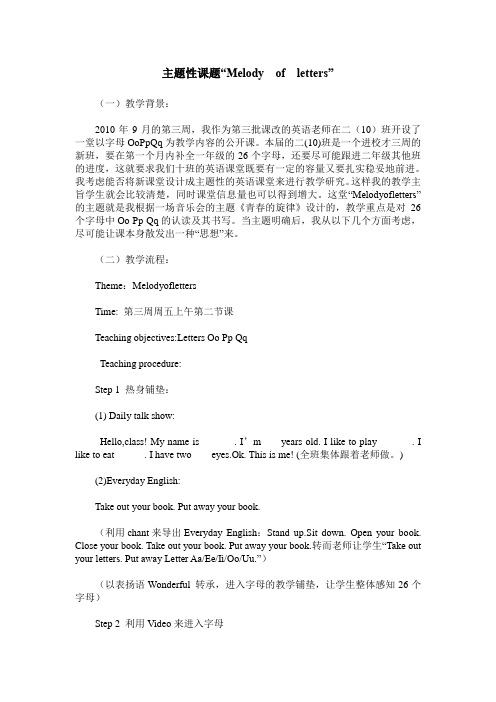
主题性课题“Melody of letters”(一)教学背景:2010年9月的第三周,我作为第三批课改的英语老师在二(10)班开设了一堂以字母OoPpQq为教学内容的公开课。
本届的二(10)班是一个进校才三周的新班,要在第一个月内补全一年级的26个字母,还要尽可能跟进二年级其他班的进度,这就要求我们十班的英语课堂既要有一定的容量又要扎实稳妥地前进。
我考虑能否将新课堂设计成主题性的英语课堂来进行教学研究。
这样我的教学主旨学生就会比较清楚,同时课堂信息量也可以得到增大。
这堂“Melodyofletters”的主题就是我根据一场音乐会的主题《青春的旋律》设计的,教学重点是对26个字母中Oo Pp Qq的认读及其书写。
当主题明确后,我从以下几个方面考虑,尽可能让课本身散发出一种“思想”来。
(二)教学流程:Theme:MelodyoflettersTime: 第三周周五上午第二节课Teaching objectives:Letters Oo Pp QqTeaching procedure:Step 1 热身铺垫:(1) Daily talk show:Hello,class! My name is_______. I’m____years old. I like to play_______. I like to eat______. I have two____eyes.Ok. This is me! (全班集体跟着老师做。
)(2)Everyday English:Take out your book. Put away your book.(利用chant来导出Everyday English:Stand up.Sit down. Open your book. Close your book. Take out your book. Put away your book.转而老师让学生“Take out your letters. Put away Letter Aa/Ee/Ii/Oo/Uu.”)(以表扬语Wonderful 转承,进入字母的教学铺垫,让学生整体感知26个字母)Step 2 利用Video来进入字母(1)欣赏精美绝伦的人体字母(色彩、造型极美)----视(2)播放以“感恩的心”为音乐的字母手语歌---视、听(3)试唱以“感恩的心”为音乐的字母手语歌---唱、做(以评价语OK进入字母Oo的教学)Step3 教学Oo Pp Qq教学OoT: Where can we find Oo?Ss: Ican find Oo in the ….Oo的生活化:Goooooooooooooogle -----听、说、读写Oo: 在四线三格里写Oo, 在第五线上摆一个五线谱符号休止符o,以艺术化的五线谱符号代表小写字母o。
快乐的英语活动
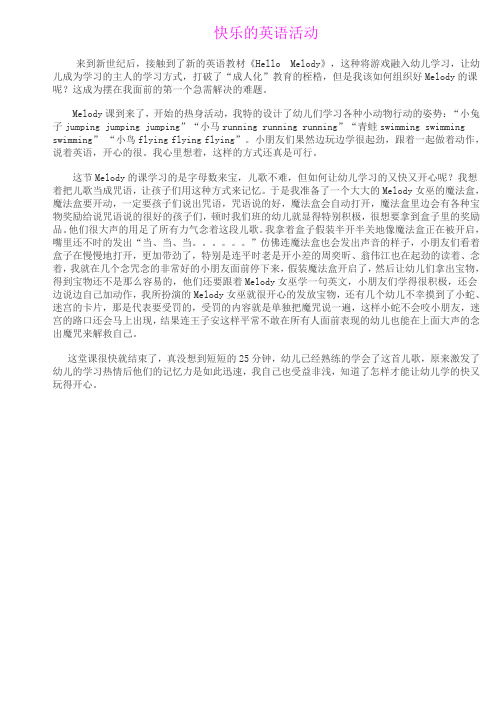
快乐的英语活动来到新世纪后,接触到了新的英语教材《Hello Melody》,这种将游戏融入幼儿学习,让幼儿成为学习的主人的学习方式,打破了“成人化”教育的桎梏,但是我该如何组织好Melody的课呢?这成为摆在我面前的第一个急需解决的难题。
Melody课到来了,开始的热身活动,我特的设计了幼儿们学习各种小动物行动的姿势:“小兔子jumping jumping jumping”“小马running running running”“青蛙swimming swimming swimming” “小鸟flying flying flying”。
小朋友们果然边玩边学很起劲,跟着一起做着动作,说着英语,开心的很。
我心里想着,这样的方式还真是可行。
这节Melody的课学习的是字母数来宝,儿歌不难,但如何让幼儿学习的又快又开心呢?我想着把儿歌当成咒语,让孩子们用这种方式来记忆。
于是我准备了一个大大的Melody女巫的魔法盒,魔法盒要开动,一定要孩子们说出咒语,咒语说的好,魔法盒会自动打开,魔法盒里边会有各种宝物奖励给说咒语说的很好的孩子们,顿时我们班的幼儿就显得特别积极,很想要拿到盒子里的奖励品。
他们很大声的用足了所有力气念着这段儿歌。
我拿着盒子假装半开半关地像魔法盒正在被开启,嘴里还不时的发出“当、当、当。
”仿佛连魔法盒也会发出声音的样子,小朋友们看着盒子在慢慢地打开,更加带劲了,特别是连平时老是开小差的周奕昕、翁伟江也在起劲的读着、念着,我就在几个念咒念的非常好的小朋友面前停下来,假装魔法盒开启了,然后让幼儿们拿出宝物,得到宝物还不是那么容易的,他们还要跟着Melody女巫学一句英文,小朋友们学得很积极,还会边说边自己加动作,我所扮演的Melody女巫就很开心的发放宝物,还有几个幼儿不幸摸到了小蛇、迷宫的卡片,那是代表要受罚的,受罚的内容就是单独把魔咒说一遍,这样小蛇不会咬小朋友,迷宫的路口还会马上出现,结果连王子安这样平常不敢在所有人面前表现的幼儿也能在上面大声的念出魔咒来解救自己。
中班美乐蒂英语创意教案:发挥创造力,创意英语学习方式
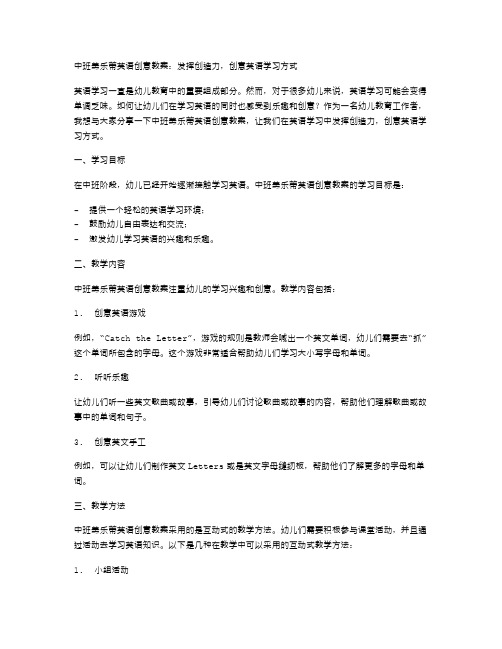
中班美乐蒂英语创意教案:发挥创造力,创意英语学习方式英语学习一直是幼儿教育中的重要组成部分。
然而,对于很多幼儿来说,英语学习可能会变得单调乏味。
如何让幼儿们在学习英语的同时也感受到乐趣和创意?作为一名幼儿教育工作者,我想与大家分享一下中班美乐蒂英语创意教案,让我们在英语学习中发挥创造力,创意英语学习方式。
一、学习目标在中班阶段,幼儿已经开始逐渐接触学习英语。
中班美乐蒂英语创意教案的学习目标是:-提供一个轻松的英语学习环境;-鼓励幼儿自由表达和交流;-激发幼儿学习英语的兴趣和乐趣。
二、教学内容中班美乐蒂英语创意教案注重幼儿的学习兴趣和创意。
教学内容包括:1.创意英语游戏例如,“Catch the Letter”,游戏的规则是教师会喊出一个英文单词,幼儿们需要去“抓”这个单词所包含的字母。
这个游戏非常适合帮助幼儿们学习大小写字母和单词。
2.听听乐趣让幼儿们听一些英文歌曲或故事,引导幼儿们讨论歌曲或故事的内容,帮助他们理解歌曲或故事中的单词和句子。
3.创意英文手工例如,可以让幼儿们制作英文Letters或是英文字母缝纫板,帮助他们了解更多的字母和单词。
三、教学方法中班美乐蒂英语创意教案采用的是互动式的教学方法。
幼儿们需要积极参与课堂活动,并且通过活动去学习英语知识。
以下是几种在教学中可以采用的互动式教学方法:1.小组活动让幼儿们分成小组,完成不同的英语活动和游戏。
2.角色扮演通过角色扮演的方式让幼儿们学习英语句子和对话。
3.互动游戏通过互动游戏的方式让幼儿们学习英语单词和句子。
4.故事阅读通过故事阅读的方式,让幼儿们学习英语单词和句子,并且锻炼他们阅读和理解能力。
四、教学评估对于小班的幼儿来说,评估是一个非常重要的环节。
在教学结束后,我们需要进行调查研究来了解这个教学对幼儿的学习产生了什么影响。
以下是教师可以采用的一些评估方法:1.问卷调查通过问卷调查的方式来了解幼儿对这个教学的喜爱度和知识掌握程度。
大班音乐教育活动do le mi教案
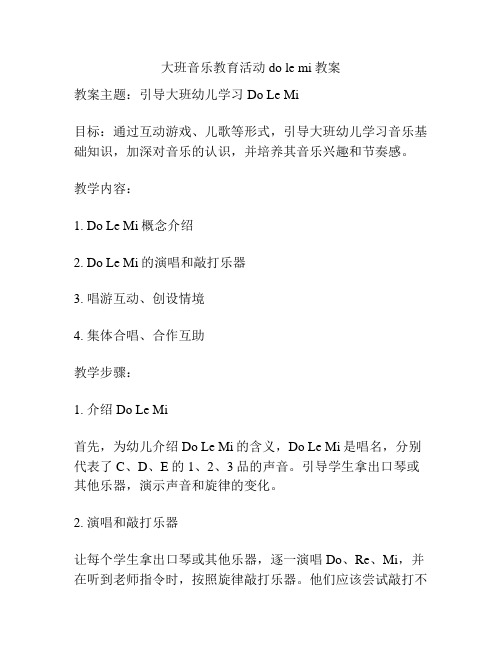
大班音乐教育活动do le mi教案教案主题:引导大班幼儿学习Do Le Mi目标:通过互动游戏、儿歌等形式,引导大班幼儿学习音乐基础知识,加深对音乐的认识,并培养其音乐兴趣和节奏感。
教学内容:1. Do Le Mi概念介绍2. Do Le Mi的演唱和敲打乐器3. 唱游互动、创设情境4. 集体合唱、合作互助教学步骤:1. 介绍Do Le Mi首先,为幼儿介绍Do Le Mi的含义,Do Le Mi是唱名,分别代表了C、D、E的1、2、3品的声音。
引导学生拿出口琴或其他乐器,演示声音和旋律的变化。
2. 演唱和敲打乐器让每个学生拿出口琴或其他乐器,逐一演唱Do、Re、Mi,并在听到老师指令时,按照旋律敲打乐器。
他们应该尝试敲打不同的部位,制造出不同的声音。
3. 唱游互动,创设情境为了帮助大班幼儿了解乐器演奏的基础,教师会逐步引导学生参与唱游、创设情境,例如在假日时播放圣诞歌曲,并让学生参与重现场景,包括演唱、敲打乐器等等。
4. 集体合唱、合作互助最后,班级一起合唱儿歌,并且利用乐器和声音来创造出激励人心的合唱效果,这可以帮助幼儿通过团队合作、音乐技巧和乐感的发展,提高合作精神和拓展交际圈。
评价:该教案设定的目标清晰明确,行为锚点明确,结合互动游戏、敲打乐器等形式,让幼儿通过节奏感发展,能够准确地唱出Do Le Mi这三个唱名,这一教学方法能更好地实现音乐教育,适合大班幼儿以得到丰富的精神体验。
此外,在教学的过程中,老师能够通过游戏等多种方式,提高幼儿的参与度,让他们更加积极地参与到学习Do Le Mi的过程中。
例如,将学生分成小组,进行音乐小组竞赛。
在比赛时,可以通过不同的节奏比较和竞技游戏的形式,让幼儿在乐学、乐器和表演方面体验到收获和成就感。
此次音乐教学活动,不仅能让孩子们学习到基础乐理知识,还可以培养幼儿的音乐创造性思维和艺术感受力,提升幼儿对音乐的认知水平,同时也能够让他们在音乐活动中得到快乐和成就感,进一步增强其自我意识和自信心。
黄金时代园Melody.
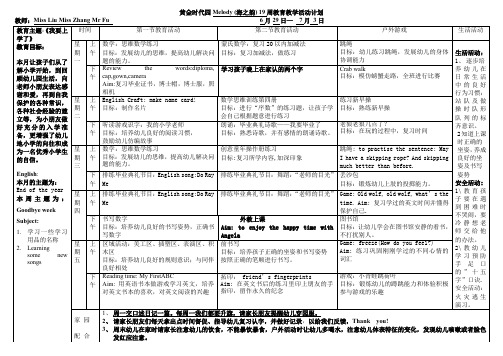
排练毕业典礼节目:English song:Do Ray Me
排练毕业典礼节目:舞蹈:“老师的目光”
丢沙包
目标:锻炼幼儿上肢的投掷能力。
星期四
上午
排练毕业典礼节目:English song:Do Ray Me
排练毕业典礼节目:舞蹈:“老师的目光”
Game: Old wolf, old wolf, what’s the time. Aim:复习学过的英文时间并懂得保护自己.
游戏:小青蛙跳荷叶
目标:锻炼幼儿的蹲跳能力和体验积极参与游戏的乐趣
家园
配合
1、周一交口述日记一篇。每周一我们都要升旗,请家长朋友提醒幼儿穿园服。
2、请家长朋友们每天拿出点时间督促、指导幼儿复习认字,并做好记录,以给我们反馈,Thank you!
3、周末幼儿在家时请家长注意幼儿的饮食,不能暴饮暴食,户外活动时让幼儿多喝水,注意幼儿体表特征的变化,发现幼儿咳嗽或者脸色发红应注意。
English:
本月的主题为:
End of the year
本周主题为:Goodbye week
Subject:
1.学习一些学习用品的名称
2.Learning some new songs
时间
第一节教育活动
第二节教育活动
户外游戏
生活活动
星期一
上午
数学:思维数学练习
目标:发展幼儿的思维,提高幼儿解决问题的能力。
星期三
上午
数学:思维数学练习
目标:发展幼儿的思维,提高幼儿解决问题的能力。
创意童年操作册练习
目标:复习所学内容,加深印象
跳绳: to practise the sentence: May I have a skipping rope? And skipping much better than before.
幼儿园中班英语教案《美乐蒂"wegetable"》园内观摩活动设计

幼儿园中班英语教案《美乐蒂"wegetable"》园内观摩活动设计教案背景随着社会的发展,英语已成为一种国际性的语言,英语教育也逐渐被重视。
在幼儿教育中,英语教育也越来越重要。
通过英语教育,可以培养幼儿的英语语言能力,提高幼儿的英语学习兴趣,扩大幼儿的知识面。
本教案所使用的英语教材为美国人教育界知名教育家JeanPiaget所著的《美乐蒂》,其中一节课为《wegetable》。
教学目标1.掌握单词vegetable。
2.培养幼儿的英语学习兴趣。
3.提高幼儿的英语听力和表达能力。
教学内容和重点1.听、说单词vegetable。
2.学习日常表达语句。
3.观察和描述蔬菜的颜色、形状和大小。
教学步骤1.引入通过唱歌、问候等方式,渐进式地让幼儿进入英语学习的氛围。
利用电子屏幕或幻灯片播放vegetable的图片,引发幼儿的兴趣,让幼儿主动询问和表达。
2.播音播放vegetable所对应的英语音频文件,让幼儿先听一遍。
再重复听几遍,帮助幼儿掌握单词的发音和基本意思。
3.说单词请幼儿跟读老师所说的单词,慢慢地提高语速,逐渐进入英语口语的训练。
4.复述故事通过老师分段朗读故事,让幼儿听懂和理解故事的内容。
再请幼儿逐段复述故事,并理解其内涵。
在此过程中,特别鼓励幼儿多使用vegetable、like等单词和日常表达。
5.观察和描述蔬菜请幼儿观察图片中的蔬菜,并描述它们的颜色、形状和大小。
在描述过程中,老师可以给予适当的提示和引导。
如,It’s a big green pepper. I like tomato. 。
活动设计本教案计划在日常英语教学中,引入一个园内观摩活动Design a Vegetable Garden,让幼儿通过参加观摩活动,加深对英语蔬菜词汇的理解和知识,增加幼儿户外活动时间,培养幼儿的乐观进取的品质。
活动目标1.了解不同蔬菜的外貌特征。
2.呈现蔬菜的颜色、形状和大小。
3.增强幼儿对植物的保护意识。
大班dolemi教案
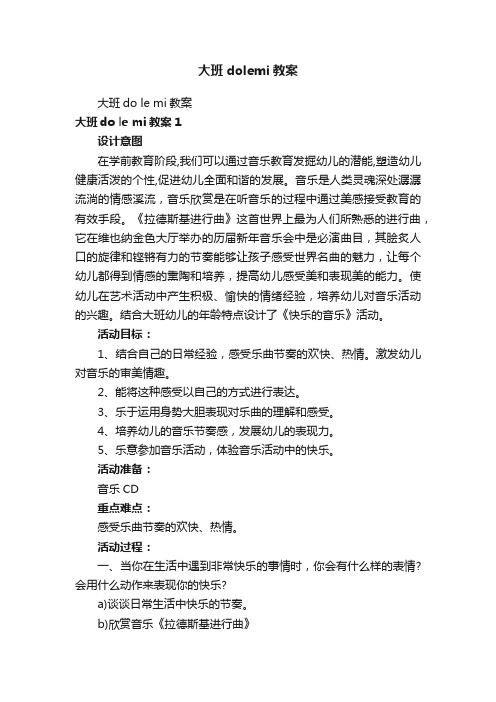
大班dolemi教案大班do le mi教案大班do le mi教案1设计意图在学前教育阶段,我们可以通过音乐教育发掘幼儿的潜能,塑造幼儿健康活泼的个性,促进幼儿全面和谐的发展。
音乐是人类灵魂深处潺潺流淌的情感溪流,音乐欣赏是在听音乐的过程中通过美感接受教育的有效手段。
《拉德斯基进行曲》这首世界上最为人们所熟悉的进行曲,它在维也纳金色大厅举办的历届新年音乐会中是必演曲目,其脍炙人口的旋律和铿锵有力的节奏能够让孩子感受世界名曲的魅力,让每个幼儿都得到情感的熏陶和培养,提高幼儿感受美和表现美的能力。
使幼儿在艺术活动中产生积极、愉快的情绪经验,培养幼儿对音乐活动的兴趣。
结合大班幼儿的年龄特点设计了《快乐的音乐》活动。
活动目标:1、结合自己的日常经验,感受乐曲节奏的欢快、热情。
激发幼儿对音乐的审美情趣。
2、能将这种感受以自己的方式进行表达。
3、乐于运用身势大胆表现对乐曲的理解和感受。
4、培养幼儿的音乐节奏感,发展幼儿的表现力。
5、乐意参加音乐活动,体验音乐活动中的快乐。
活动准备:音乐CD重点难点:感受乐曲节奏的欢快、热情。
活动过程:一、当你在生活中遇到非常快乐的事情时,你会有什么样的表情?会用什么动作来表现你的快乐?a)谈谈日常生活中快乐的节奏。
b)欣赏音乐《拉德斯基进行曲》c)再次倾听,并介绍音乐背景。
d)第三遍欣赏音乐,仔细分辨。
二、这是一首什么样的乐曲?你听了以后感觉怎么样?三、这首曲子什么地方强劲有力些?什么地方又优美柔和些?四、幼儿在音乐声中走出教室。
延伸活动:鼓励幼儿在活动区中,用绘画、手工等方式表现音乐内容。
活动反思:本次音乐律动所选用的乐曲就是《拉德斯基进行曲》,这首乐曲有着明显的进行曲风格,很适宜在行进中模仿律动。
结合大班幼儿的年龄特点,充分调动幼儿的想象力,引出音乐都是有节奏的、要跟着音乐的节奏走路。
教师在引导个别幼儿示范,要求其他幼儿边看、发现问题、解决问题、集体做动作。
充分调动幼儿自主探索学习的积极性,从而发现音乐的节奏感。
do re mi教案
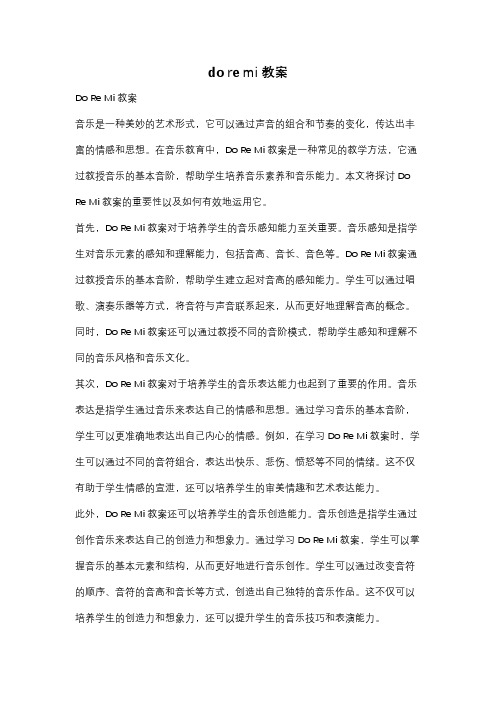
do re mi教案Do Re Mi教案音乐是一种美妙的艺术形式,它可以通过声音的组合和节奏的变化,传达出丰富的情感和思想。
在音乐教育中,Do Re Mi教案是一种常见的教学方法,它通过教授音乐的基本音阶,帮助学生培养音乐素养和音乐能力。
本文将探讨Do Re Mi教案的重要性以及如何有效地运用它。
首先,Do Re Mi教案对于培养学生的音乐感知能力至关重要。
音乐感知是指学生对音乐元素的感知和理解能力,包括音高、音长、音色等。
Do Re Mi教案通过教授音乐的基本音阶,帮助学生建立起对音高的感知能力。
学生可以通过唱歌、演奏乐器等方式,将音符与声音联系起来,从而更好地理解音高的概念。
同时,Do Re Mi教案还可以通过教授不同的音阶模式,帮助学生感知和理解不同的音乐风格和音乐文化。
其次,Do Re Mi教案对于培养学生的音乐表达能力也起到了重要的作用。
音乐表达是指学生通过音乐来表达自己的情感和思想。
通过学习音乐的基本音阶,学生可以更准确地表达出自己内心的情感。
例如,在学习Do Re Mi教案时,学生可以通过不同的音符组合,表达出快乐、悲伤、愤怒等不同的情绪。
这不仅有助于学生情感的宣泄,还可以培养学生的审美情趣和艺术表达能力。
此外,Do Re Mi教案还可以培养学生的音乐创造能力。
音乐创造是指学生通过创作音乐来表达自己的创造力和想象力。
通过学习Do Re Mi教案,学生可以掌握音乐的基本元素和结构,从而更好地进行音乐创作。
学生可以通过改变音符的顺序、音符的音高和音长等方式,创造出自己独特的音乐作品。
这不仅可以培养学生的创造力和想象力,还可以提升学生的音乐技巧和表演能力。
然而,要有效地运用Do Re Mi教案,教师需要注意一些关键点。
首先,教师应该根据学生的年龄和音乐水平,选择合适的教学内容和教学方法。
对于初学者来说,教师可以从简单的音阶开始教授,逐渐引导学生掌握更复杂的音乐技巧。
其次,教师应该注重培养学生的音乐兴趣和激发学生的学习热情。
幼儿园中班英语教案《美乐蒂"wegetable"》园内观摩活动设计
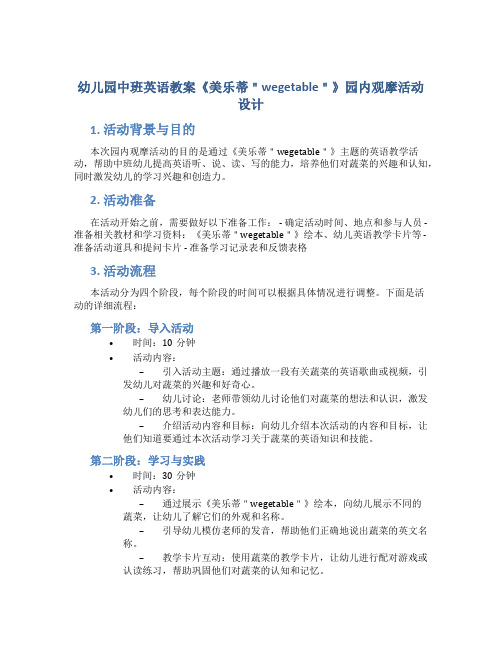
幼儿园中班英语教案《美乐蒂"wegetable"》园内观摩活动设计1. 活动背景与目的本次园内观摩活动的目的是通过《美乐蒂"wegetable"》主题的英语教学活动,帮助中班幼儿提高英语听、说、读、写的能力,培养他们对蔬菜的兴趣和认知,同时激发幼儿的学习兴趣和创造力。
2. 活动准备在活动开始之前,需要做好以下准备工作: - 确定活动时间、地点和参与人员 - 准备相关教材和学习资料:《美乐蒂"wegetable"》绘本、幼儿英语教学卡片等 - 准备活动道具和提问卡片 - 准备学习记录表和反馈表格3. 活动流程本活动分为四个阶段,每个阶段的时间可以根据具体情况进行调整。
下面是活动的详细流程:第一阶段:导入活动•时间:10分钟•活动内容:–引入活动主题:通过播放一段有关蔬菜的英语歌曲或视频,引发幼儿对蔬菜的兴趣和好奇心。
–幼儿讨论:老师带领幼儿讨论他们对蔬菜的想法和认识,激发幼儿们的思考和表达能力。
–介绍活动内容和目标:向幼儿介绍本次活动的内容和目标,让他们知道要通过本次活动学习关于蔬菜的英语知识和技能。
第二阶段:学习与实践•时间:30分钟•活动内容:–通过展示《美乐蒂"wegetable"》绘本,向幼儿展示不同的蔬菜,让幼儿了解它们的外观和名称。
–引导幼儿模仿老师的发音,帮助他们正确地说出蔬菜的英文名称。
–教学卡片互动:使用蔬菜的教学卡片,让幼儿进行配对游戏或认读练习,帮助巩固他们对蔬菜的认知和记忆。
–制作蔬菜拼贴画:为了培养幼儿的动手能力,可以让幼儿使用剪纸、彩纸等材料制作自己喜欢的蔬菜拼贴画。
第三阶段:园内观摩活动•时间:40分钟•活动内容:–准备参观场景:在园区的蔬菜园或植物园设置几个展示台,上面摆放不同的蔬菜,并贴上对应的英文名称。
–参观蔬菜园:幼儿分小组参观蔬菜园,老师逐一介绍蔬菜,让幼儿亲自触摸和闻味。
–提问互动:老师提出关于蔬菜的问题,鼓励幼儿积极回答,并向幼儿提供帮助和指导。
–反馈记录:老师记录幼儿对蔬菜的认知和印象,以及他们对参观活动的反馈意见。
- 1、下载文档前请自行甄别文档内容的完整性,平台不提供额外的编辑、内容补充、找答案等附加服务。
- 2、"仅部分预览"的文档,不可在线预览部分如存在完整性等问题,可反馈申请退款(可完整预览的文档不适用该条件!)。
- 3、如文档侵犯您的权益,请联系客服反馈,我们会尽快为您处理(人工客服工作时间:9:00-18:30)。
Reading Aloud
班级:G308 教师:Melody
Teaching Aims:
1.to understand the importance of reading aloud
2.to get to know how to improve related skills of reading
3.to foster students‟ interest and confidence in reading and speaking English
Teaching Procedure
Step1:考试流程
Step2: 范例学习
Contents:
You are too concerned with what was and what will be. There is a saying: Yesterday is history,tomorrow is a mystery, but today is a gift. That is why it is called the present.
Summary技巧
•一、音标
发音秘诀:
1.长元音拉长,双元音饱满
2.短元音急促有力收小腹,干净利落
3.咬舌头
4.连音
5.略音
•二、重音
•1.句子重音:关键词
名词、实义动词、形容词、副词、数词、指示代词、疑问词和感叹词等一般都重读。
而冠词、介词、连词和一般性的代词则不重读。
…What’s the …matter?
•The …sweater is …beautiful.
•Your …book is on the …desk.
He …usually …gets up at …six o’clock.
•2.逻辑重音;表现说话人的思想和他所要表达的意思的重点。
Did you tell my …wife?
Did you tell …my wife?
Did …you tell my wife?
三、连读与弱读
连读现象
1、辅音+元音:在一句话中,前一个单词以辅音结尾,后一个单词以元音开头
That is an apple
连读小练习
Up and down Put it on Not at all In an hour Take off Pick it up Good idea Knock him out Stand up
2.元音的连读现象
My-uncle The end Three hours We all Worry about [w] [v] How old are you ? 归纳:词尾有[u]的,需要加半元音[w]
连读小练习
Flew in the sky How old How is Too easy
弱读现象
辅音+辅音:在一句话中,前一个单词以辅音结尾,后一个单词以辅音开头,后一个辅音发音,前一个不发音
Help me Bad boy I don‟t like them. Sit still Give me a hand
弱读现象特例[h]
击穿连读----"h"被击穿连读:即一个辅音与一个以"h"字母打头的单词结合时,[h]音被击穿,辅音与"h"后面的音连读.
for h\im ask h\im let h\im reach h\im tell h\im tell h\er
听力最大的陷阱
半元音[ j ]的学问
would you [d]+[j]=[d3] miss you [s]+[j] aren't you [t]+[j]
because you [z]+[j]=[3] That's your [ts]+[j] sends you [dz]+[j]=[d3]
四、意群
意群就是指句子中按意思和语法结构划分出的各个成分,每一个成分即称为一个意群。
注意:意群之间的停顿是根据说话人情况而定,并非一定要停顿不可。
但如有停顿,则必在意群之间,随意乱停就破坏了语言的节奏。
•Reading aloud /is very important / for beginners.
•Early to bed / and early to rise / makes a man / healthy, happy, and wise.
•Jane, / who‟s a brilliant swimmer, / represented Britain / at the Olympic Games.
•After he took his bath, / he dressed in a hurry, / ran to catch the bus, / and got to his appointment / before it was too late.
五、语调
•英语语调主要有降调、升调和降升调三大类。
降调
用于陈述句
I have already read that book. ↘
That street is two miles long. ↘
•用于特殊疑问句
•What has happened to him? ↘
Which direction is it to the post office? ↘
•注意:特殊疑问句有时可用升调表示请别人重复刚说过的话:
What is your major? ↗
Where shall we go for the holiday? ↗
用于祈使句
Go back to your seat! ↘
Please do not hesitate to contact me. ↘
用于感叹句
What a small world! ↘
Oh! My poor Mary, how you‟ve changed! ↘
用于选择疑问句中“or”之后的部分
Do you want to ride or walk? ↘
Would you like tea or coffee ? ↘
升调
用于一般疑问句
Do you mind if I sit here? ↗
Can you hand in your compositions today? ↗
注意:一般疑问句有时也可用降调,表示一种不耐烦的口气,或表示命令等。
Are you satisfied? ↘
Will you take off your hat, please? ↘
于罗列中最后一项之前的各项
For each incomplete sentence, there are four choices marked A↗, B↗, C↗, and D. ↘We study Chinese ↗, history ↗, geography ↗, and English. ↘
用于陈述句,表示疑问、怀疑、未定、猜测或期待等
Your really want to do it? ↗
She might have gone. ↗
I think so. ↗
用于置于句首的状语短语或状语从句
After dinner ↗, I read a magazine and made telephone calls. ↘
While you were writing letters ↗, I was reading a book. ↘
用于并列句的第一个分句,表示句子还未说完
My fever is gone ↗, but I still have a cough. ↘
My major is English ↗, and I like it. ↘
用于委婉祈使句
Excuse me, sir ↗. Can you help me? ↗
用于称呼语
Mrs. Smith ↗, this is Tom Jones. ↘
降升调
“话里有话”,或通过语调表示“言外之意”。
•常用于以下情况:含有对比的陈述句、含保留意见的陈述句、含警告口吻的祈使句等。
Step3:练习Percy Buttons
I have just moved to a house in Bridge Street. Yesterday a beggar knocked at my door. He asked me for a meal and a glass of beer. In return for this, the beggar stood on his head and sang songs. I gave him a meal. He ate the food and drank the beer. Then he put a piece of cheese in his pocket and went away. Later a neighbor told me about him. Everybody knows him. His name is Percy Buttons. He calls at every house in the street once a month and always asks for a meal and a glass of beer.。
